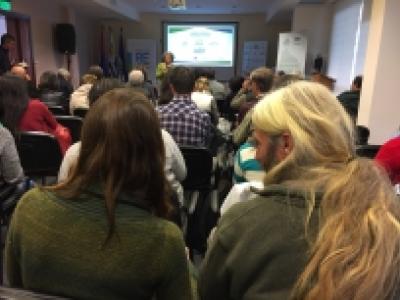Adaptation dialogues - Family farmers address adaptation in Uruguay

Montevideo, 15 May, 2017 - A wide stakeholder consultation is fundamental during the process of integrating agriculture into Uruguay's National Adaptation Plan.
Through a series of adaptation dialogues, the UNDP-FAO Integrating Agriculture in National Adaptation Plans Programme (NAP-Ag) team in Uruguay is laying the foundation for its agricultural sector adaptation plan. During the month of May two workshops were held – one for the forestry sector and one for a cross cutting-dialogue that included family farmers from all the production systems.
The Family Farming Adaptation Dialogue was organized together with the national section of the Specialized Reunion of Family Farmers (REAF) of the Southern Common Market (MERCOSUR). More than 40 farmers, including crop producers, dairy farmers, livestock farmers, fishermen, sheep farmers, as well as fruticulture and horticulture farmers, brought their concerns and their contributions to the dialogue.
The identification of the changes in climate that will have the strongest impact was the first step of the dialogue. Participants tended to identify the most recent weather events easily while it was harder to envision the long-term trends and changes. However, they pointed out that there is currently an adaptation gap that should not be ignored. Moreover, the fact is that for family farmers there is a direct relationship between the impacts of climate change on their production and the impacts on the wellbeing of the family itself.
“It is not one event in particular that affects us more, but the occurrence of one or more of them at unexpected times…in our case it can vary within a year. For example, in 2015 we lost 70 percent of our corn due to water deficit during the summer, and the same year the excess rain in the fall made it impossible to plant the wheat because it was too wet,” said Mauricio, a crop farmer from Canelones.
The adaptation alternatives identified in such a diverse group cut across territories, production sectors and social issues. Actions were identified that were specific to certain agriculture sectors, such as the need for port infrastructure, public support programmes for animal feed or the need for plant breeding of certain crops. However, there were also issues, like the need to develop systems for water storage and harvest for periods of drought and the need for financial tools and index insurance to deal with the losses of infrastructure and crops due to extreme events, that would improve adaptation to climate change across production systems.
Socio-economic challenges featured prominently in the dialogue due to the close link between the production and family income. Women pointed out that they value participation in production decisions and also in participation on decisions on how to use or invest the product of the harvest. It was pointed out that, due to the challenging work conditions at the farms, many families prioritize the education of their children in the cities leading to uprooting of generations and loss of culture and traditions.
You can read more about the dialogue in Spanish here. Originally published on the FAO website.
Rohini Kohli, UNDP Lead Technical Specialist for National Adaptation Plan and Green Low Emission Climate Resilient Development Strategies, rohini.kohli@undp.org
